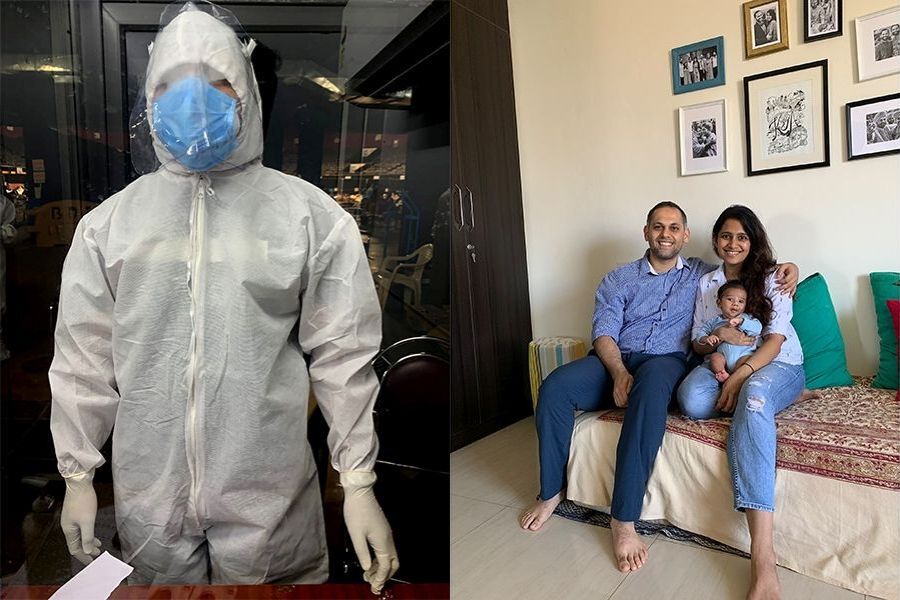Covid-19 patients by day, a newborn by night
A freshly minted father, Dr Arjun Singh, a head and neck cancer specialist, has found himself at the frontlines of the coronavirus pandemic


 Dr Arjun Singh says it is tough to even drink water when in PPE Singh at home with his wife, Keya, and two-month-old son, Aveer.[br]
Dr Arjun Singh says it is tough to even drink water when in PPE Singh at home with his wife, Keya, and two-month-old son, Aveer.[br]
Just as India went into a nationwide lockdown on March 25—yet to lift more than two months later—Dr Arjun Singh, a Mumbai-based head and neck cancer specialist, became a father his son was born on March 26, and his life was about to change in more ways than one.
“Our parents couldn’t come to meet him at the hospital when he was born,” he recalls. “It was sad, but we understood the situation. I was lucky to be granted two weeks of paternity leave at this time.”
Singh works at the Tata Memorial Hospital, which is said to receive 65,000 new cancer patients every year from across the country, many of whom come from low-income backgrounds. Once back at work, Singh, along with his team, noticed that the number of patients was rising more than usual. “Co-morbidities, including cancer, play a very important role in your predisposition to Covid-19,” Singh says.
According to ICMR guidelines, if you have cancer, you fall directly into the ‘severe’ category of Covid-19, irrespective of how grave your symptoms are. “We devised a strategy to test everyone before going for surgery, and a lot of them had the coronavirus, along with cancer. Numbers started piling at the hospital, and we needed to find room to isolate them,” he says. "Some of their treatment would be delayed, but we have no choice, unfortunately we have to adhere to the guidelines."
The team identified space at the makeshift Covid-19 care centre built in NSCI’s Dome in Worli, which is where Singh now begins his workday, at 7.30 am. He sees about 40-50 patients each day for consultations, understanding their problems, counselling them when necessary. “They all have just one question—when will I be discharged?” he says. “We have had people who have tested positive four times, which means they have been here a month. It is unnerving, of course, and we have to remind them that they need to be patient. It’s tough to find ways to cheer them up, sometimes.”
Some problems, the doctors didn’t anticipate—for instance, when they began to call Covid-19-positive cancer patients into NSCI, their relatives would come along to drop them off, even hug them goodbye. “We just watched this unfold in front of us, in disbelief. Of course, we had to take those relatives in to isolate too,” he says.
Others, who come to Tata Memorial for care and can’t afford accommodation in Mumbai, had no way to even get to NSCI. “I’ve gone with my car at nights to help them with their luggage, driving at speeds of 10 and 20 kmph as they walked alongside, making sure they are okay, since I couldn"t be in direct contact with them either. I sprayed and sanitised my car later,” he adds.
NSCI is a contactless facility patients are seen from behind a shield, using gloves and a stethoscope for examination. Singh does go in when patients require special care—feeding assistance, for instance.
“Doctors get the credit, but the nurses are the real frontline heroes,” he adds. “I would also give a lot of credit to the state government. To see an organisation like the BMC move effectively is amazing—at an extremely low cost per bed, the NSCI facility is a fantastic example of what a public private partnership can achieve. It’s a model that should be replicated.”
Singh says he has no fixed time for meals when he’s at work—“If you’re in PPE, you can’t visit the bathroom, can’t even drink water,” he adds.
He devotes half of his time at Tata Memorial to research, and here too, enrols patients in studies, examines their reports and collects data for larger medical exploration. Some nights, he stops by Tata Memorial before going home by 8 pm, as required.
With an infant at home, Singh makes sure to rush to the shower once home, before interacting with his family. “For the next hour, I’m on baby duty. This is the only time in the day my phone is on silent,” he says.
After oiling, bathing and putting his son to bed, Singh logs in to work again around 9.15 pm, to furnish statistics collected through the day. After his wife and baby are asleep, until about midnight, he’s up writing his research papers—and then up again at 3 am, with his son. “Once my wife is done feeding him, I swaddle and put him back to sleep. Then he’s up at 6 am, and the day begins again.”
On some occasions, the day begins even earlier, if patients suddenly desaturate or need emergency care. “That’s something I am now used to,” he says. “It’s why my phone is only ever on silent for that hour.”
Singh says he was afraid initially, to work with Covid-19 patients with a baby at home. “But I told myself that if I didn’t do it now, I would regret it—this time is crucial, and won’t come back,” he says.
This is Part 1 of a daily series on how Covid-19 has upended the daily lives of essential workers across the country
First Published: Jun 01, 2020, 13:14
Subscribe Now